
Vatican City, Oct 7, 2021 / 06:50 am (CNA).
Pope Francis said on Thursday that he plans to declare St. Irenaeus of Lyon a Doctor of the Church with the title “Doctor unitatis,” meaning “Doctor of Unity.”
The pope made the announcement in a speech to the St. Irenaeus Working Group, a group of Catholic and Orthodox theologians who conducted a study together on synodality and primacy.
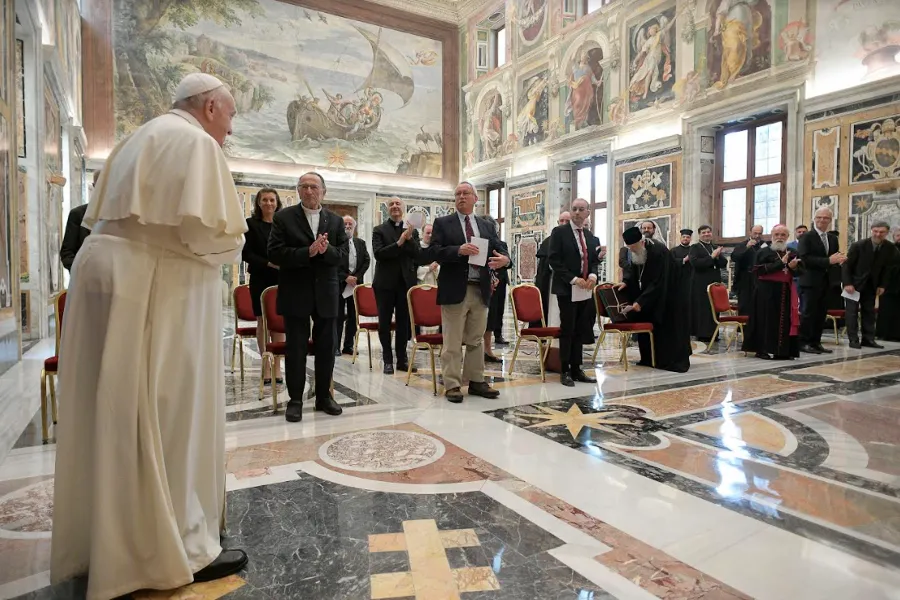
“Your patron, St. Irenaeus of Lyon — whom soon I will willingly declare a Doctor of the Church with the title Doctor unitatis — came from the East, exercised his episcopal ministry in the West, and was a great spiritual and theological bridge between Eastern and Western Christians,” Pope Francis said on Oct. 7.
St. Irenaeus was a second-century bishop and writer revered by both Catholics and Orthodox Christians and known for refuting the heresies of Gnosticism with a defense of both Christ’s humanity and divinity.
The U.S. bishops voted last year in favor of having St. Irenaeus named a Doctor of the Church at the request of Cardinal Philippe Barbarin, the then archbishop of Lyon, southern France, and sent their approval to the Vatican for the pope’s consideration.
Pope Francis previously declared St. Gregory of Narek, a 10th-century Armenian monk, a Doctor of the Church in 2015.
Benedict XVI named Sts. John of Avila and Hildegard of Bingen as Doctors of the Church in 2012.
Seventeen of the 36 figures declared Doctors of the Church by the Catholic Church lived before the Great Schism of 1054 and are also revered by Orthodox Christians.
“His name, Irenaeus, contains the word ‘peace,’” Pope Francis said. “We know that the Lord’s peace is not a ‘negotiated’ peace, the fruit of agreements meant to safeguard interests, but a peace that reconciles, that brings together in unity. That is the peace of Jesus.”
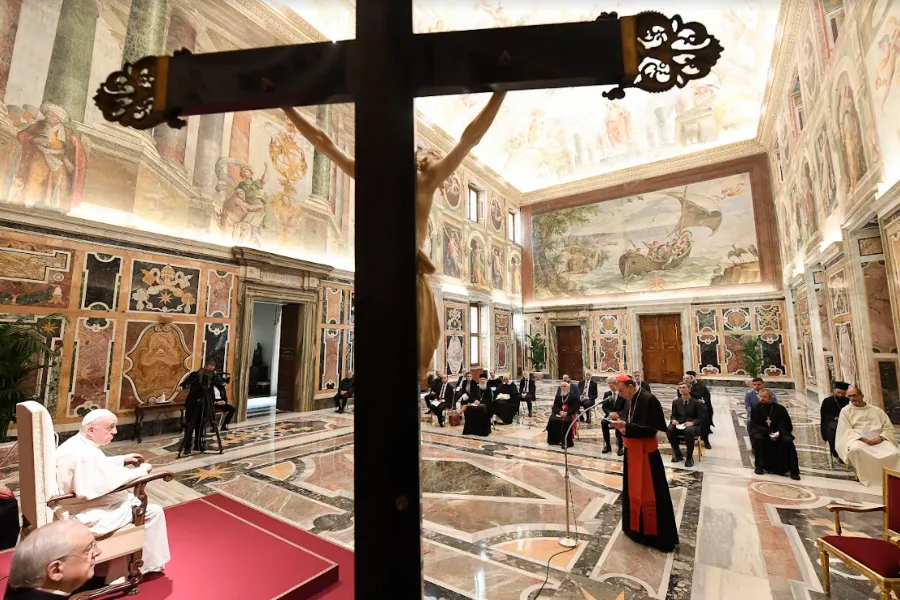
The pope spoke about synodality and primacy during his meeting with the St. Irenaeus Working Group, a joint Orthodox-Catholic working group from the Institute for Ecumenical Studies at the Pontifical University of St. Thomas in Rome.
“A fruitful approach to primacy in theological and ecumenical dialogues must necessarily be grounded in a reflection on synodality. There is no other way.” Pope Francis said.
“I have frequently expressed my conviction that in a synodal Church, greater light can be shed on the exercise of the Petrine primacy.”
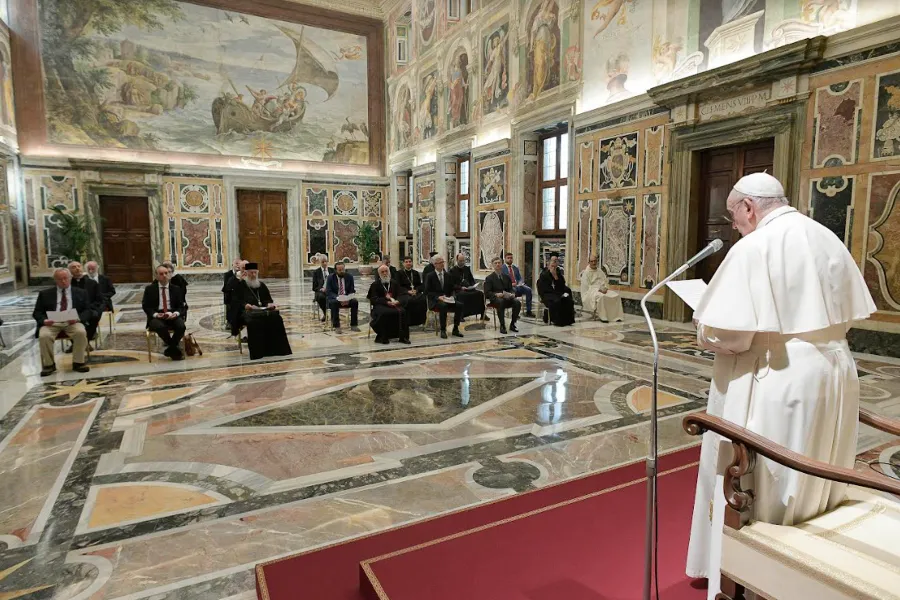
Petrine primacy refers to the absolute authority of the pope as a pastor and governor with immediate and direct jurisdiction over the whole Church.
The primacy of the Bishop of Rome is one of the major issues of disagreement that has kept Orthodox Christians apart from the Catholic Church. The Eastern Orthodox have a conciliar model of the Church, rather than a centralized authority.
Pope Francis thanked the group for its recently issued study, “Serving Communion: Re-thinking the Relationship between Primacy and Synodality.”
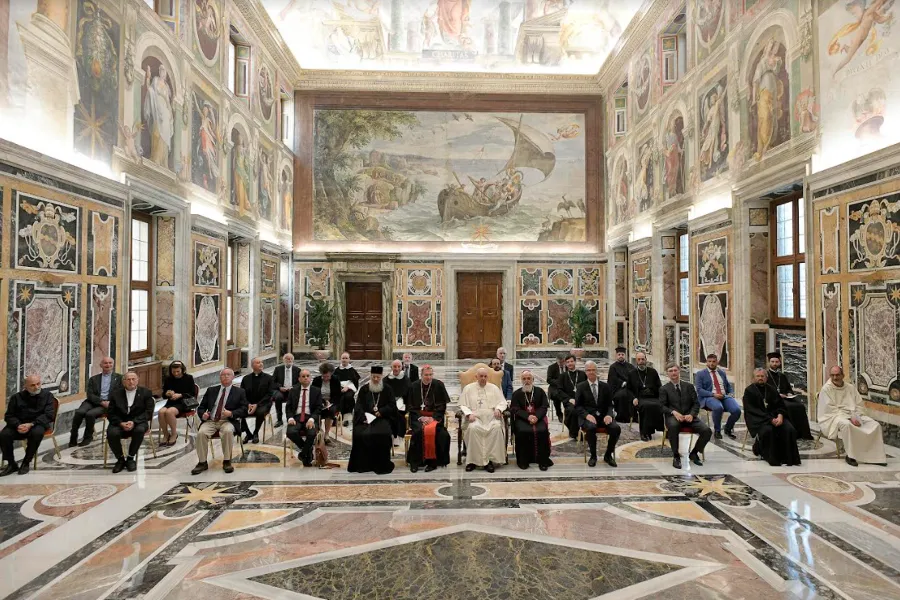
“Through the constructive patience of dialogue, especially with the Orthodox Churches, we have come to understand more fully that in the Church primacy and synodality are not two competing principles to be kept in balance, but two realities that establish and sustain one another in the service of communion,” the pope said.
“Just as the primacy presupposes the exercise of synodality, so synodality entails the exercise of primacy.”
Pope Francis expressed hope that the Catholic Church’s upcoming synod on synodality will allow Catholics around the world to reflect on synodality and Petrine primacy.
The pope will kick off the Church’s three-year synodal process this weekend with a Mass on Oct. 10. All dioceses have also been invited to offer an opening Mass the following Sunday on Oct. 17.
“I am confident that, with the help of God, the synodal process that will begin in the coming days in every Catholic diocese will also be an opportunity for deeper reflection on this important aspect, together with other Christians,” Pope Francis said.
Pope Francis noted that the group of Orthodox and Catholic scholars had chosen St. Irenaeus as their patron.
“Dear friends, with the help of God, you too are working to break down dividing walls and to build bridges of communion,” he added.
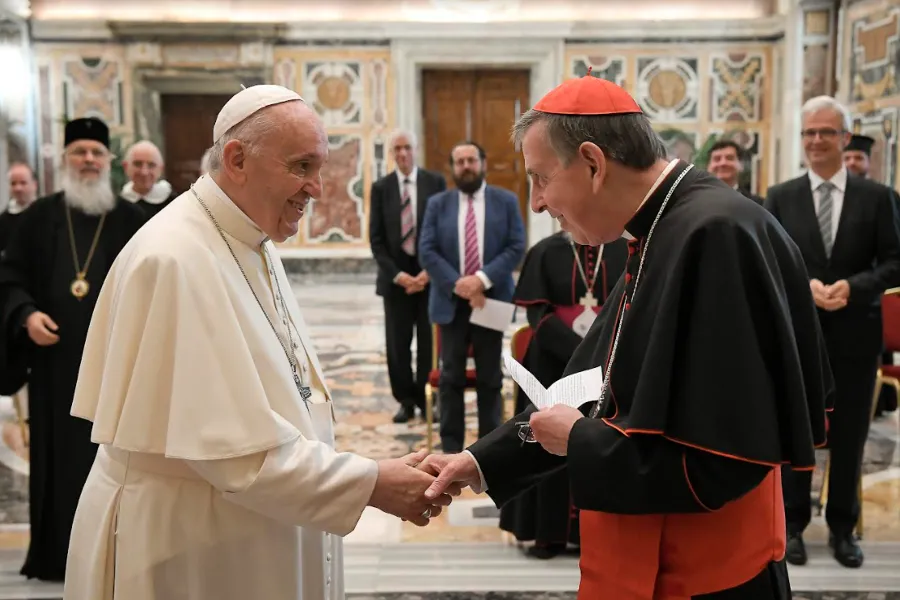
Cardinal Kurt Koch, the president of the Pontifical Council for Promoting Christian Unity, also participated in the papal audience with the St. Irenaeus working group.
The cardinal has argued that strengthening synodality is “the most important contribution” that the Catholic Church can make to ecumenical dialogue, especially dialogue with the Orthodox.
“This synod will not only be an important event in the Catholic Church, but it will contain a significant ecumenical message, since synodality is an issue that also moves ecumenism, and moves it in depth,” Koch wrote in the Vatican newspaper L’Osservatore Romano on Jan. 18.
He pointed to the 2007 Declaration of Ravenna, in which Catholic and Orthodox theologians agreed that the bishop of Rome was the “protos,” or first among patriarchs, before the separation of East and West.
“The fact that the two dialogue partners were able to declare together for the first time that the Church is structured synodally at all levels and therefore also at the universal level, and that she needs a protos is an important milestone in Catholic-Orthodox dialogue,” he said.
For this step to bear fruit in the future, Koch wrote, it is necessary to deepen the relationship between synodality and primacy.
If you value the news and views Catholic World Report provides, please consider donating to support our efforts. Your contribution will help us continue to make CWR available to all readers worldwide for free, without a subscription. Thank you for your generosity!
Click here for more information on donating to CWR. Click here to sign up for our newsletter.






Saint Irenaeus is certainly an excellent candidate as a doctor of ecclesial unity between E Orthodox and W Latins. A brief history warrants consideration whether Irenaeus would have preferred unity based on a synodal Church structure, or would he have preferred the traditional Latin doctrine of Roman centrality. Recent initiative regarding Irenaeus as a bridge is found 2016 with, “Rector Thierry Magnin from Lyon Catholic University [UCLY]. He explains, ‘I believe the theology of Saint Irenaeus is in many ways a common ground between eastern and western traditions of Christianity. At UCLY, we were first involved in cooperation with the Anaphora Institute on a formation on human rights and local development, but we have come to realize increasingly in our work that Saint Irenaeus really is a common father in our different church traditions, and so we decided to organize a conference here together, to explore this further’” (World Council of Churches). Anaphora [near Cairo] chaired by Coptic Bishop Thomas has legitimate concern with Islamic militancy and oppression of Copts. Surely a worthy cause and understandably his appeal to world churches. Rome would be an important ally and likely is already involved. However, my anticipation of His Holiness’ avocation of Irenaeus as a theological model for connectedness is in line with a form of interrelated synodality. Each church one among many. Saint Irenaeus was nevertheless an exceptional advocate for Roman centrality. A well known text historically used in polemics, “Since, however, it would be very tedious, in such a volume as this, to reckon up the successions of all the Churches, we do put to confusion all those who, in whatever manner, whether by an evil self-pleasing, by vainglory, or by blindness and perverse opinion, assemble in unauthorized meetings; [we do this, I say,] by indicating that tradition derived from the apostles, of the very great, the very ancient, and universally known Church founded and organized at Rome by the two most glorious apostles, Peter and Paul; as also [by pointing out] the faith preached to men, which comes down to our time by means of the successions of the bishops. For it is a matter of necessity that every Church should agree with this Church, on account of its preeminent authority [potiorem principalitatem] (Irenaeus Against Heresies Book III, Chapter 3 Ad 2).
Time to RECALL, too, when in 1980 Pope John Paul II proclaimed SS. Cyril and Methodius co-Patrons of Europe together with St. Benedict, saying: ” It seemed to Us that the protection with regard to the whole of Europe would be better highlighted if We added to the great work of the Holy Western Patriarch (St. Benedict) [the] particular merits of the two Holy Brothers, SS. Cyril and Methodius.”
Thinking very LONG-TERM HISTORY, do we now foresee an eventual new beginning—namely a synodal/patriarchal Church also under the primacy of Peter—reaching from the Atlantic to the Urals? Much more expansive and inclusive (!) than the secularist and post-Christian European Union backwater. Even larger than the lost Christendom under Charlemagne. And, throw in the Americas as well.
The bishops of the Church, “[t]ogether with its head, the Roman Pontiff, and never without this head…” (Lumen Gentium, Ch. 3, n. 22, and especially the added “Explanatory Note”).
The biggest FLY in the ointment (and the holy water), of course, is the contagious German “synodal way” and its allies, who would: eliminate the sacerdotal priesthood, fast-talk the chasm between apostolic/universal Catholic Christianity and protesting congregational denominations, and bless homosexual couplings (that “fly” again!)—overturning even the natural understanding of millennia of human sexuality and our family “orientation,” shall we say, toward our future here and hereafter.
With Shakespeare: “out damn spot, out I say!”
How about John Paul 2 as the next Dr. of the church
For me, the bar for Doctor of the Church is set by St Thomas Aquinas. There are lots of things that JP II allowed to happen that St Thomas would not have done that or would have spoken up against those things. I like JP II and think about him often but I don’t know about him as being a Dr of the church.
Examples:
JP II ignored advice against promoting Theodore McCarrick (look him up if you don’t know) to cardinal.
Instituted World Youth Day which from the beginning was dubbed “Catholic Woodstock” where the youth… let’s say, were not modest.
Also, during a World Youth Day, a female mime played the role of Jesus (look up video of Mother Angelica about this)
October 27, 1986. “Interfaith Service” in Assisi Italy with heretics, schismatics and pagans. Many incidents here, all under his supervision. For example, with his permission, the Dalai Lama and a group of Buddhists entered the church of San Pietro, set up a statue of Buddha on the tabernacle of the altar. Lots if issues due to this event.
May 8, 1984. JP II at a “mass” where the epistle was read by a bare-breasted woman.
May 14, 1999. JP II bowed and kissed the Qu’ran (Islam’s holy book)
Instances of JP II giving communion in the hand.
I want the pope to be the most zealous in the protection of our catholic faith and morals. I don’t think St. Thomas Aquinas would not have allowed that to happen under his watch and would speak up against it.
Father Z has some interesting details about why Pope Benedict XVI did not declare Irenaeus a Doctor of the Church.
ASK FATHER: St. Irenaeus… Doctor of the Church?
Excerpt:
At the request of Card. Ratzinger, the “Augustinianum” studied the question of Irenaeus as Doctor and concluded, “No.” Why? Because no Father before Nicea can really be a Doctor of the Church because they all lack a developed orthodox understanding of the Trinity.
That might have disappointed Card. Ratzinger a little, I don’t know. But, when he could have, Papa Ratzinger didn’t make Irenaeus a Doctor. He must have found it a) convincing because of the ante-Nicean angle or b) it wasn’t timely.